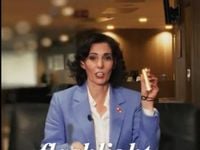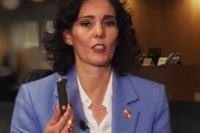The European Union is taking significant steps to prepare its citizens for a wide array of potential crises, including natural disasters, armed conflicts, and hybrid threats. On March 26, 2025, during a press conference in Brussels, EU Commissioner for Crisis Management Hadja Lahbib unveiled a comprehensive strategy titled the "European Union Strategy for Preparation." This initiative outlines 30 key actions aimed at enhancing the EU's resilience in the face of emergencies.
Among the most notable components of this strategy is a proposal for citizens to maintain a survival kit that ensures at least 72 hours of self-sufficiency during a crisis. The kit, as showcased in a somewhat lighthearted promotional video by Lahbib, includes essential items such as water, food, medication, and tools necessary for survival.
"In case of extreme disruptions, the initial period is the most critical," Lahbib stated during the presentation. "The Commission will propose guidelines for member states to achieve a population self-sufficiency of at least 72 hours." This proposal reflects the EU's recognition of the increasing frequency of natural disasters, technological failures, and geopolitical tensions that could impact its member states.
The strategy is particularly timely given the ongoing conflict in Ukraine and rising concerns about hybrid threats, including cyber-attacks and misinformation campaigns. The EU has allocated a staggering 800 billion euros for rearmament, signaling a shift towards a more proactive approach in safeguarding its citizens.
In a video that has sparked both interest and criticism, Lahbib humorously detailed the contents of her survival kit, which includes not only practical items like a flashlight and Swiss army knife but also less conventional choices such as playing cards for entertainment. "A little distraction doesn’t hurt anyone," she quipped, emphasizing the importance of maintaining morale during tough times.
The video, however, has faced scrutiny for its casual tone in the face of serious topics. Critics have pointed out that while the initiative is necessary, the presentation may not adequately reflect the gravity of the situations it aims to prepare for. The Five Star Movement (M5S) party in Italy expressed discontent, stating, "While they play around, the war in Ukraine continues and European citizens are facing skyrocketing bills. This Commission should resign immediately."
Despite the mixed reactions, the EU's plan does aim to equip citizens with practical knowledge and resources. The guidelines will include recommendations for stocking essential supplies and ensuring access to shelters during emergencies. A new online platform will also provide personalized information to citizens about potential risks and practical measures to mitigate them.
The survival kit suggested by the EU includes items such as:
- Glasses and essential documents in a waterproof bag
- A flashlight and matches or a lighter
- A water bottle and food supplies
- A multi-function Swiss army knife
- Medications and cash
- A charger and power bank
- Playing cards for entertainment
- A small battery-powered radio
As Lahbib cheerfully noted in her video, "Cash is king in a crisis, while credit cards are just pieces of plastic." This emphasis on cash reflects a broader understanding of the potential disruptions that could accompany emergencies, where electronic payment systems may fail.
The EU's strategy is not just a response to current events but a proactive measure to safeguard its citizens. The guidelines for member states will be developed over a period extending to 2027, with specific recommendations on emergency kits set to be released in 2026. These measures include revising civil protection mechanisms and even establishing a European space shield to better defend the EU's security interests.
Member states like France, Sweden, and Finland already have established emergency guidelines, which include provisions for food, water, and medical supplies. For instance, the Swedish emergency plan advises maintaining good relations with neighbors, as they may be crucial during a crisis.
While Lahbib’s presentation style has drawn mixed reviews, the underlying message is clear: the EU is urging its citizens to take preparedness seriously. As the world becomes increasingly unpredictable, the need for individuals to be ready for emergencies has never been more pressing.
In conclusion, the EU's preparation strategy represents a significant shift towards recognizing the importance of individual readiness in the face of potential crises. Whether through practical survival kits or comprehensive guidelines, the initiative aims to empower citizens while navigating the complexities of modern threats.






